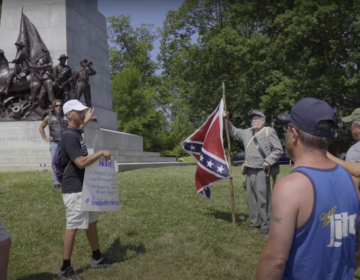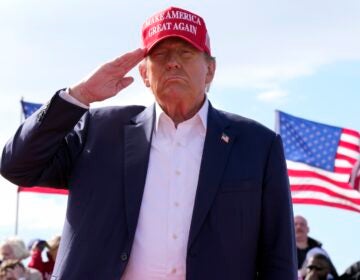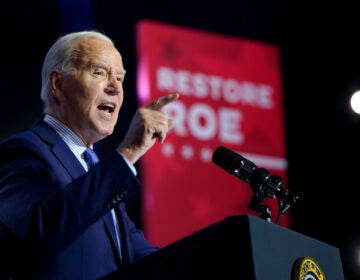These Pa. leaders helped beat Trump. Here’s what they expect from Biden
Many agree on at least one thing: when Biden takes office, they aren’t expecting all the concerns of the Trump years to magically disappear.
Listen 2:14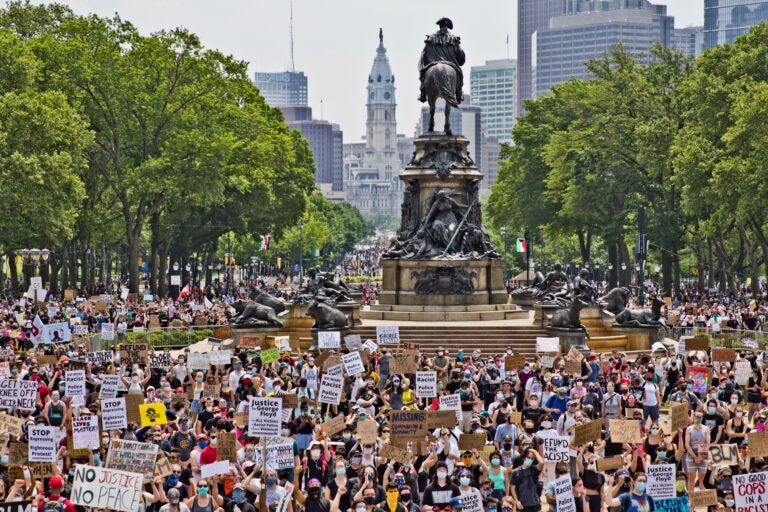
Protesters took over the Benjamin Franklin Parkway on June 6, 2020. (Kimberly Paynter/WHYY)
When Joe Biden becomes president on Jan. 20, he was greeted by a broad, relatively new network of grassroots organizers who are hoping to hold him to his many campaign promises.
Over the last four years, the political landscape has changed a lot for Democrats. Galvanized by Donald Trump’s election, progressive groups sprang up across purple states like Pennsylvania. They cropped up in cities like Philadelphia, developed in affluent, historically Republican suburbs, and even rebounded in some historically Democratic rural areas that had flipped to Trump.
Members’ priorities vary widely. But many agree on at least one thing: With Biden in office, they aren’t expecting all their concerns to magically disappear.
Some organizers, like Blanca Pacheco, say many she works alongside are cautiously hopeful, though.
Pacheco is co-director of the New Sanctuary Movement in Philadelphia, an interfaith, multicultural immigrant justice movement. She has been paying close attention to the Biden administration’s promises to immediately begin working on immigration policy, and is eager for more details in the plan expected to be revealed Wednesday to create an eight-year path to citizenship for undocumented U.S. residents who were present in the U.S. on Jan 1.
“Some people are excited and have a lot of questions, and some people are not necessarily believing it because this promise of immigration reform has been there for years and years and years,” Pacheco said. “Actually what the community has received is deportation [and] family separation.”
The Washington Post reported that that plan also calls for addressing causes of migration in Central America, which include gang violence and economic hardship.
Pacheco said that will be necessary.
“In 2-3 years, if the root causes of immigration are not addressed, we’re going to be having the same problem. People are leaving these countries for survival,” she said.
Other organizers, particularly ones who are newer to politics, say their main plan is to stay the course and continue growing the Democratic infrastructure that started as a reaction to Trump.
Alissa Packer is a quintessential example of the growing grassroots movement Pennsylvania has seen under the Trump administration. In 2016, the Cumberland County biology professor was a committed Democrat and a regular voter. But her involvement in politics ended there.
“I wasn’t well-educated on the candidates or the local issues in municipal elections,” she said. “I never knew anybody running for office before 2016.”
Feeling blindsided and frustrated after Trump’s election, Packer started finding common ground with a lot of her fellow liberal women in Camp Hill — a relatively white, affluent suburb outside of Harrisburg.
Four years later, she’s a member of the Camp Hill Borough Council and helps lead Capital Region Stands Up, a chapter of the statewide organization Pennsylvania Stands Up, which also formed in resistance to Trump after 2016.
The group’s goals include raising wages, furthering racial equity, decreasing corporate influence in politics and getting more progressives elected. They’ve made some headway. But, Packer adds, there’s a lot of work left to do — both in continuing to push Biden to adopt progressive policies and in creating a truly statewide coalition of organizers.
“A lot of the spaces that I’ve been organizing in are primarily white spaces,” she said. “If we want to build the power we need, to have a truly multiracial democracy, we have a lot of work to do as white people.”
Onah Ossai, another Capital Region Stands Up organizer, can attest to that.
She’s Black, lives outside Harrisburg, and has been involved in various activist causes in the city for years. In her experience, “multi-racial, multi-class organizing” is hard — at least in part, because “the people who have the time, the resources and the energy to participate are typically not the marginalized.”
But she adds, her experience with Capital Region Stands Up has been good. She found the group after a canvasser came to her door and started a conversation about health care. She had a lot of thoughts, and an organizer followed up with her after.
Nearly a year later, Ossai is deeply involved in the group, working to push Harrisburg to lower its spending on police and route more resources toward social work in hopes of keeping people out of the criminal justice system.
“I don’t think that any of us, including people who worked hard to get Biden elected, had any notion that he was going to save us from these problems,” Ossai said. “I think we will absolutely be pressuring as much as we can on the federal and the state level to make sure policies aren’t put in place that would increase policing, increase surveillance.”
‘Weather the storm’
Rev. Mark Kelly Tyler, a Philadelphia-based organizer who also focuses on criminal justice reform, feels similarly.
Policing reform, he says, is an issue that “in the past, both [President Joe Biden and Vice President Kamala Harris] have struggled with.”
Tyler is the senior pastor of Mother Bethel AME church and the co-director of POWER Live Free, a campaign to end gun violence, mass incarceration, and “the criminalization of Black and Brown bodies.” He wants the Department of Justice to have more oversight of local police forces, “to rein in bad policing in cities like Philadelphia” — something Biden promised to do during his campaign — and he wants the incoming administration to address the roots of crime, like poverty, by raising the minimum wage.
“In the case of Democrats, very often one bad story, one bad headline, has often made them shy away, and back away from progressive, meaningful reforms,” he said. “I’m hoping they can weather the storm.”
Some organizers plan to keep their focus close to home. Devren Washington, a founder of the Philadelphia Community Bail Fund and member of Black Lives Matter Philly, said the groups he is involved with will “still be focusing on what conditions make our communities most equitable.” In Philadelphia, that means poverty, access to affordable housing, and over-policing in Black neighborhoods.
“What was true under the Trump administration is still true under a Biden administration,” Washington said. The country is still suffering through a pandemic and a recession, which disproportionately hurt Black and brown communities.
Washington, who also wants to see police budgets trimmed to fund community development, has been disappointed by Biden’s skepticism of the defund movement, especially in light of the Jan. 6 insurrection, which implicated some local police.
“You want to give them more money, and they haven’t even done the bare minimum to be accountable for the issues that we all know that they have,” he said, referring to comments Biden made during his campaign that he would give police departments an additional $300 million for community policing initiatives.
Washington said that failure to recognize the lack of reform means Biden is “out of touch” with the need for systemic changes.
Lara Putnam, a historian at the University of Pittsburgh, said there is a lot of evidence that the wave of grassroots organizing that the Trump administration kick-started will keep having an effect well into the future.
For the past few years, she’s been studying the growth of local political networks. And she notes, new organizers play different roles in different places.
In Philadelphia, where there’s a long history of Democratic Party machine politics, there have been clashes between establishment candidates and new progressives. In the suburbs, which were already getting bluer, suddenly-robust Democratic groups have made significant gains in congressional and state legislative races. In more conservative areas, Putnam has seen Trump resistance groups emerge, as well as an increase in Democratic candidates for local offices, like school boards.
But all of that, she says, builds lines of communication between political constituencies. And that’s what can ultimately influence policy, all the way up to the federal level.
“Trump was a really important catalyst for bringing new people, new energy, and initial resources into local political life,” she said. “But what has kept them there is the relationships that they’re building.”
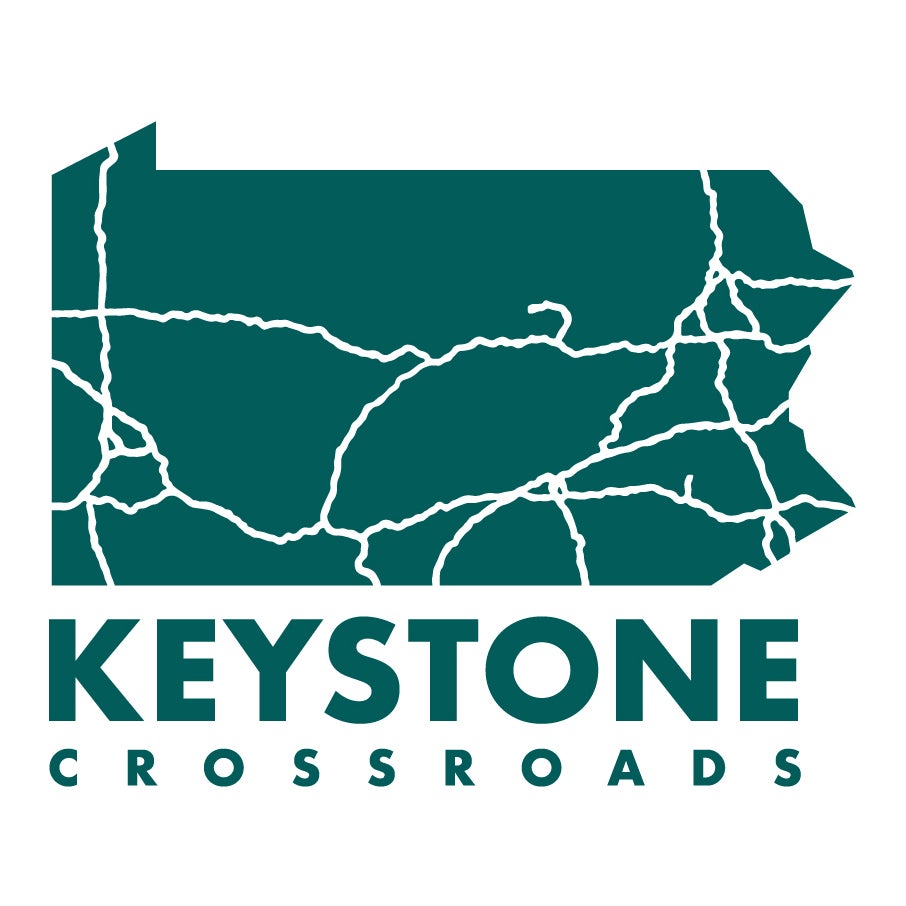
Get more Pennsylvania stories that matter
WHYY is your source for fact-based, in-depth journalism and information. As a nonprofit organization, we rely on financial support from readers like you. Please give today.



